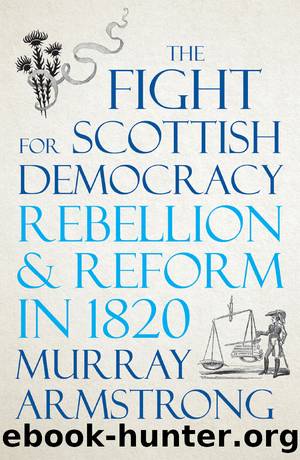The Fight for Scottish Democracy by Murray Armstrong;

Author:Murray Armstrong;
Language: eng
Format: epub
Publisher: Book Network Int'l Limited trading as NBN International (NBNi)
9
1820: Underground
‘Ministers, seeing the rapid progress of Radicalism in the country, became alarmed,’ declared the front page of the 1 January edition of Spirit of the Union. ‘That the Radicals frequently met is most true, and that they were training themselves to the use of arms is no less a fact.’ They had been defiant in the face of government threats, and kept meeting ‘for the purpose of reading the political publications of the day’; ‘reason was their sword, and the oftener it was used it became the sharper.’
The Trongate offices and the home of the paper’s editor, Gilbert McLeod, were raided and he was arrested. The Saturday 25 December edition had commented on the trial of George Kinloch and noted that, although Kinloch had failed to appear in court, the jury had been assembled and added that the practice of packing and picking juries was common; indeed, it was the law throughout Scotland. The Lord Advocate acted swiftly and brought a charge of contempt against McLeod, who was convicted on 13 January and sentenced to four months in prison. The only radical newspaper in Scotland was shut down after just ten editions by a vindictive prosecution. Other newspapers had made similar comments about the jury system without being challenged. Kinloch’s solicitor had jotted in his notes that, of the panel of forty-five men from which the jury of fifteen was to be chosen by the judges, several were ‘known to have left the ranks of the Yeomanry this morning, with blood in their eye, and breathing vengeance against the damned Radical they were about to judge’. During McLeod’s hearing, his advocate, Henry Cockburn, pointed out that the Edinburgh Correspondent, then a leading Tory newspaper, had published a much more critical article on the same subject. The court could not refuse to take up the case and the Correspondent’s editor had to be later charged and convicted.
Sandy Rodger returned to his loom and his music lessons in Bridgeton, and no doubt made regular visits to his friend in the chilly and cheerless cells of the Glasgow tollbooth in this, the coldest winter in years. ‘The Clyde forms one sheet of ice as far down as Dunglass,’ reported the Glasgow Chronicle, and it stayed that way until the end of the month. Sergeant Hutcheson of the Glasgow Sharpshooters noted that ‘The walk in the Green was a continuous sheet of ice and many of us fell upon it … Our guns we dare not load nor fix our bayonets.’
General Sir Thomas Bradford and his opposite number in the north of England, General Sir John Byng, were worried that a coordinated rising might take place on New Year’s Day. In the end their fears came to nothing. The commander in the west of Scotland reported to the Home Office that both Glasgow and Paisley were quiet on 1 January, and despite radical committees continuing ‘in full activity … they do not consider their means equal to the preparations made to resist them.’
Download
This site does not store any files on its server. We only index and link to content provided by other sites. Please contact the content providers to delete copyright contents if any and email us, we'll remove relevant links or contents immediately.
The Secret History by Donna Tartt(18130)
The Social Justice Warrior Handbook by Lisa De Pasquale(11949)
Thirteen Reasons Why by Jay Asher(8436)
This Is How You Lose Her by Junot Diaz(6426)
Weapons of Math Destruction by Cathy O'Neil(5818)
Zero to One by Peter Thiel(5480)
Beartown by Fredrik Backman(5340)
The Myth of the Strong Leader by Archie Brown(5231)
The Fire Next Time by James Baldwin(5011)
How Democracies Die by Steven Levitsky & Daniel Ziblatt(4950)
Promise Me, Dad by Joe Biden(4906)
Stone's Rules by Roger Stone(4848)
100 Deadly Skills by Clint Emerson(4683)
A Higher Loyalty: Truth, Lies, and Leadership by James Comey(4544)
Rise and Kill First by Ronen Bergman(4542)
Secrecy World by Jake Bernstein(4382)
The David Icke Guide to the Global Conspiracy (and how to end it) by David Icke(4374)
The Farm by Tom Rob Smith(4320)
The Doomsday Machine by Daniel Ellsberg(4240)
